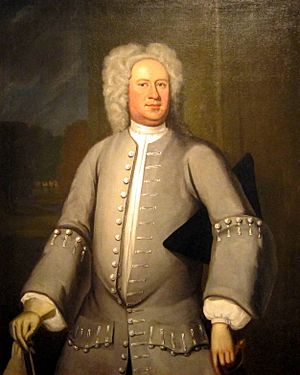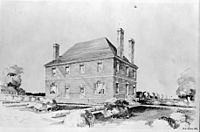Robert Carter I facts for kids
Quick facts for kids
Robert Carter I
|
|
|---|---|
 |
|
| Royal Governor of Virginia | |
| In office 1726–1727 |
|
| Preceded by | Hugh Drysdale |
| Succeeded by | Sir William Gooch |
| 25th Speaker of the Virginia House of Burgesses | |
| In office 1696–1697 |
|
| Preceded by | Philip Ludwell |
| Succeeded by | William Randolph |
| In office 1699–1699 |
|
| Preceded by | William Randolph |
| Succeeded by | Peter Beverley |
| Personal details | |
| Born | 4 August 1663 Corotoman Plantation, Lancaster County, Virginia, British America |
| Died | 4 August 1732 Lancaster County, Virginia, British America |
| Spouses | Judith Armistead Betty Landon |
| Children | 15, including Landon Carter, Charles Carter (of Cleve) |
Robert "King" Carter (1662/63 – 4 August 1732) was a very important and wealthy person in colonial Virginia. He was a merchant, a large farm owner (planter), and a powerful politician. Born in Lancaster County, Carter became one of the richest men in the American colonies.
He was called "King" Carter by people in Virginia. This nickname showed how much money, power, and control he had over his businesses and in politics. He even served as the royal governor of Virginia from 1726 to 1727. This happened after the previous governor, Hugh Drysdale, passed away. Carter was also the colony's Treasurer and served many times in the House of Burgesses. He was even chosen twice by other members to be their Speaker.
Contents
Early Life and Learning
Robert "King" Carter was born in 1662 at Corotoman Plantation in Lancaster County, Virginia. His father, John Carter, Sr., was from London, England. His mother, Sarah Ludlow, was his father's fourth wife. Sadly, his mother died soon after he was born.
When his father died in 1669, Robert's older half-brother, John, inherited most of the family's property. John also made sure Robert followed their father's wishes. This meant sending young Robert to England for his education. Robert lived in London for six years with Arthur Bailey, a tobacco merchant. There, he learned all about the tobacco trade between the colonies and England.
When Robert returned to Virginia, he likely lived at Corotoman plantation with his half-brother. Later, Robert Carter gained more land after his half-brother died without sons. He also bought more land and gained property through his marriages. In 1688, he married Judith Armistead. They had five children, but only three lived past infancy.
After Judith died in 1699, Carter married Elizabeth Landon Willis in 1701. She was a wealthy widow. They had ten children together, and seven of them grew up. King Carter made sure all his sons were educated in England. He also gave each of his sons large plantations when they were old enough to marry.

Political and Business Career
Robert Carter started his political career at age 28. He became a Burgess, representing Lancaster County in the General Assembly of Virginia. He served in this role for several years. From 1696 to 1697, he was chosen as the Speaker of the House of Burgesses. This was a very important job.
Later, he was promoted to the Governor's Council. This was the higher part of the Virginia General Assembly. He also became the colony's Treasurer. This meant he was in charge of all the money collected from taxes in Virginia. Carter also served as a justice of the peace and commanded the local militias.
Carter became a very powerful member of the Governor's Council. When Governor Hugh Drysdale died in 1726, Carter was the Council's President. This meant he became the acting Governor of Virginia until a new governor arrived. He served as governor until William Gooch took office in September 1727.
A big part of Carter's wealth came from his work as a land agent. He worked for Thomas Fairfax, 5th Lord Fairfax of Cameron, who owned a huge amount of land in Virginia. This land was called the Northern Neck. It stretched between the Potomac and Rappahannock Rivers, all the way to the Blue Ridge Mountains.
Carter's job was to find the best land and claim it. He claimed land for Lord Fairfax, but also for himself and his children. By the time he died, he owned at least 295,000 acres (about 1,200 square kilometers) of land.
Much of this land was divided into farms. These farms grew tobacco, which was the main crop sold for money. They also grew corn and wheat, and raised animals like cattle and hogs for food. Carter also owned boats and worked as an agent for people who traded in enslaved people. He used enslaved labor to work his many farms.
Death and What He Left Behind
Robert Carter passed away on August 4, 1732, in Lancaster County, Virginia. He was buried at Christ Church there.
When he died, he left his family an enormous amount of wealth. This included 300,000 acres of land, about 3,000 enslaved people, and £10,000 in cash. This made him one of the wealthiest people in the colonies.
When Lord Fairfax heard about Carter's death and his huge wealth, he was very surprised. He decided not to hire another Virginian as his land agent. Instead, he had his cousin, Colonel William Fairfax, move to Virginia to manage his land. Lord Fairfax himself later moved to Virginia permanently in 1747.
Some of Robert Carter's family papers are kept at the University of Virginia Library. You can even find some of them online.
Descendants
Robert Carter had many children and grandchildren who became important figures in Virginia and American history.
With his first wife, Judith Armistead, he had:
- Elizabeth Carter (1692-1734)
- Judith Carter (1695–1750)
- John Carter (1696–1742)
With his second wife, Betty Landon Willis, he had:
- Anne Carter (1702–1743)
- Robert Carter II (1704–1732)
- Charles Carter (1707–1764)
- Landon Carter (1710–1778)
- Mary Carter (1712–1736)
- Lucy Carter (1715–1763)
- George Carter (1718–1742)
Other notable descendants include:
- Carter Braxton, his grandson, who signed the Declaration of Independence.
- Robert E. Lee, a famous general during the American Civil War.
- John Page, a Governor of Virginia.
- Thomas Nelson Page, a US ambassador.
- William Nelson Page, an American engineer.
- James "Gentleman Jim" Robinson, a wealthy African American whose home was important during the Civil War.
Images for kids
-
Nomini Hall, Carter family plantation in Westmoreland County. Robert Carter II built it in 1730 on land his father bought.
 | William Lucy |
 | Charles Hayes |
 | Cleveland Robinson |



